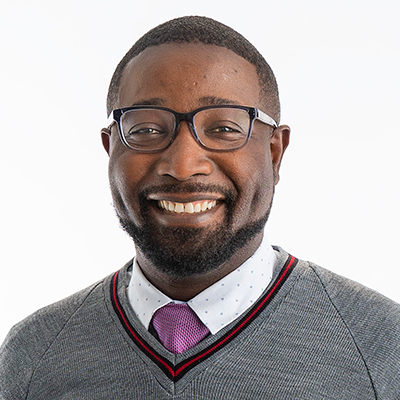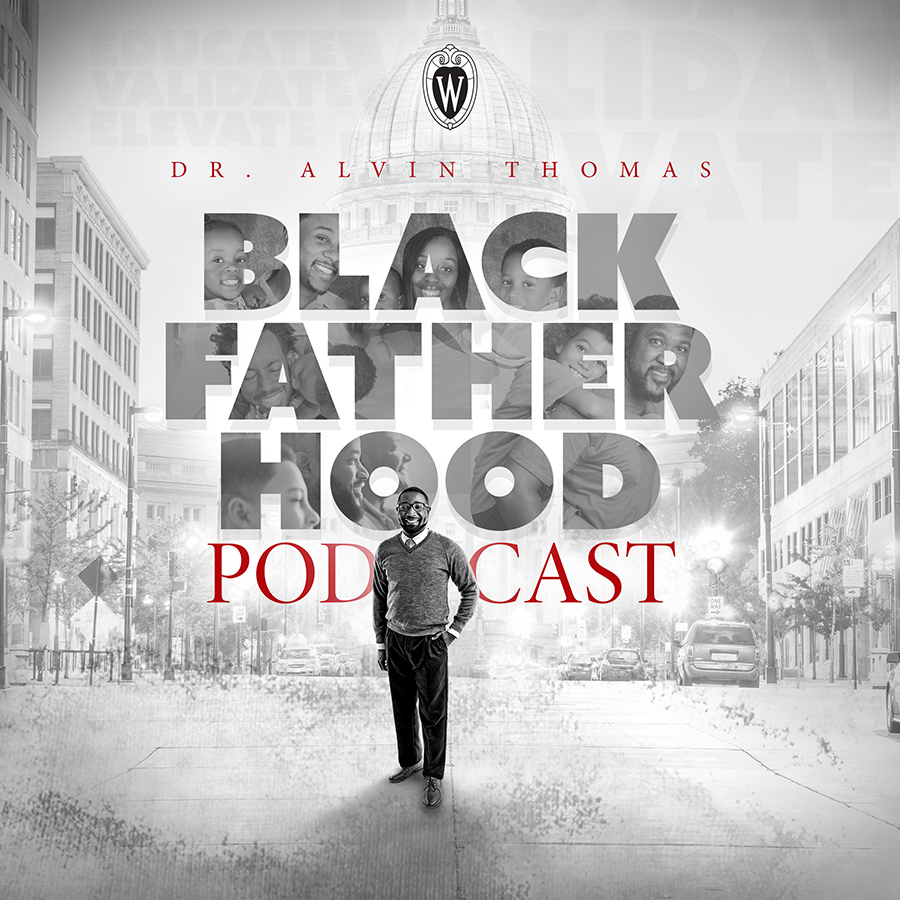February 2023
Q & A with Alvin Thomas, Ph.D.
Phyllis Northway Faculty Fellow
Assistant Professor, Human Development and Family Studies
School of Human Ecology, University of Wisconsin–Madison

Dr. Alvin Thomas is a clinically trained assistant professor of Human Development and Family Studies in the School of Human Ecology at the University of Wisconsin–Madison, where he explores positive youth development and father involvement especially among Black families. He earned his BA from Morehouse College, including a semester exchange with St. John’s University (MN), where he conducted research on male identity construction in the Caribbean. Upon graduation, he co-directed an undergraduate research team in India and Nepal working among Buddhist monks at the Dalai Lama’s monastery.
Dr. Thomas received his Ph.D. in Clinical Psychology from the University of Michigan, Ann Arbor. His dissertation, Bad Boys or Bad Odds? Race, Context, and Social Influence: An Investigation of Youth Violence in African-American Boys, encapsulates his focus on positive youth development in Black youth and their families. He then completed a postdoctoral fellowship with the Michigan Medicine’s Department of Psychiatry in the Child and Adolescent Outpatient Unit, with special rotations in trauma, community mental health, and underserved populations.
Dr. Thomas’s research and clinical work explore risk and protective factors for Black boys in conditions that imperil them toward negative outcomes. The role of neighborhood/context, family, parenting practices, fathers (nonresident fathers specifically), and youths’ individual strengths as contributors to positive youth development are key elements to his work. He investigates resilience, youth violence and exposure to violence, mood problems, suicide-related outcomes, and academic performance as outcomes of social and developmental processes.
Where are you from?
I am originally from the small tropical Caribbean island of Saint Lucia. I used to joke that my homeland could fit into Washtenaw County many times, and that the University of Michigan’s budget was several times bigger than my country’s annual GDP. But small does not mean insignificant. Without the microchip your computer and phone are glorified paper weights. And my country boasts two Nobel Laureates.
Why did you choose the University of Michigan and Michigan Medicine for your training?
I chose Michigan almost serendipitously. I had come to a Black Students’ Psychology Association’s recruitment event in my senior year while I was still applying to graduate schools, hoping to get into a clinical psychology program. I met Dr. Laura Kohn-Wood who was then a faculty member in the program. She was engaged in phenomenal research and she was an awesome human being who quickly connected with others and turned out to be a wonderful mentor and advocate. I would soon be connected with Dr. Cleopatra Caldwell in the School of Public Health, and she would eventually become my final faculty advisor.
What is most memorable about your postdoctoral training in the Department of Psychiatry?
A program was developed that allowed child fellows to travel to the Michigan Medicine clinic in Ypsilanti on a weekly basis to provide services to lower income and more racially diverse clients than the ambulatory clinic at the Rachel Upjohn Building would see. This kind of outreach was at the core of my desire to become a clinical psychologist. I was very pleased for that training experience, and I continue to cherish the lessons learned.
Where are you now and what does your work focus on?
I am at the University of Wisconsin, Madison. My Thomas Resilient Youth Lab is housed in the School of Human Ecology’s Department of Human Development and Family Studies. I recently released the “Black Fatherhood Podcast with Dr. Alvin Thomas.” I mention it because it is a microcosm of my work that intersects positive youth development among Black children, and the power of and challenges to Black father engagement.
What do you find most rewarding about your work?
The most rewarding thing about my work is watching people connect to it, and watching it being used to impact individuals and families.
What area in mental health do you think has taken the biggest toll during the COVID pandemic?
The COVID-19 pandemic shone a brilliant and uncomfortable spotlight on the inequities and inequalities in access and quality of resources and care available to Black Americans. With the pandemic largely off our collective consciousness, America has returned to that status quo of inequities, and Black and Brown Americans now have additional mental health burdens.
Depression and anxiety levels may be higher but trauma symptoms are probably being under diagnosed and under treated even more than they were before the pandemic. We saw significant negative impact of the pandemic in deaths and other costs for Black families and communities, and the resources for healing that community have yet to be made available.
What are some things you like to do in your free time?
During the pandemic I learned how to make sourdough bread, so now I make loaves and give them away to friends. For fun I try to find time to hang out with friends, watching a good movie or series, spending time with family, and attending my church services.
What is your favorite memory of your time in Ann Arbor?
My favorite memory was probably floating down the Huron river on a kayak with a group of friends.




